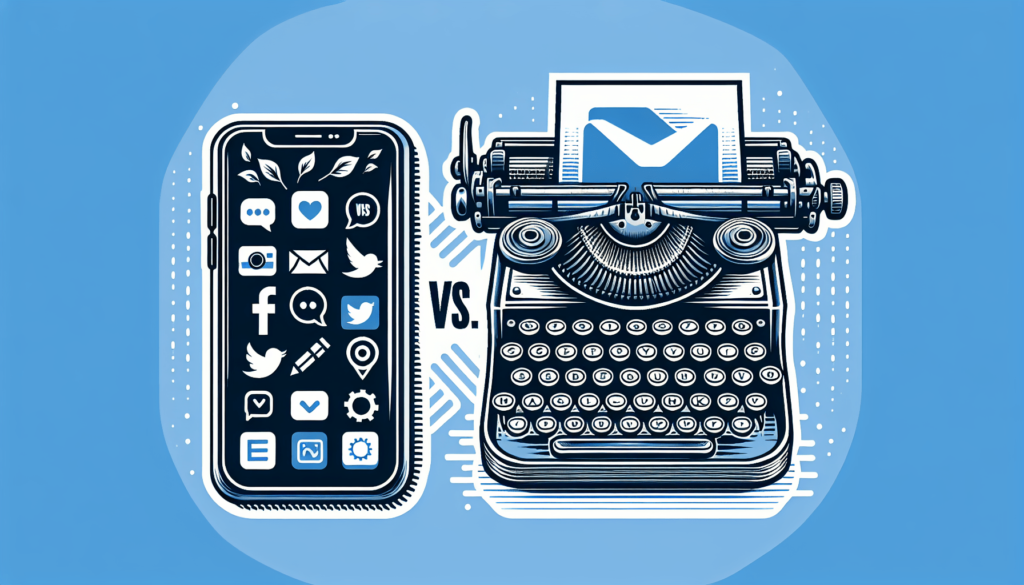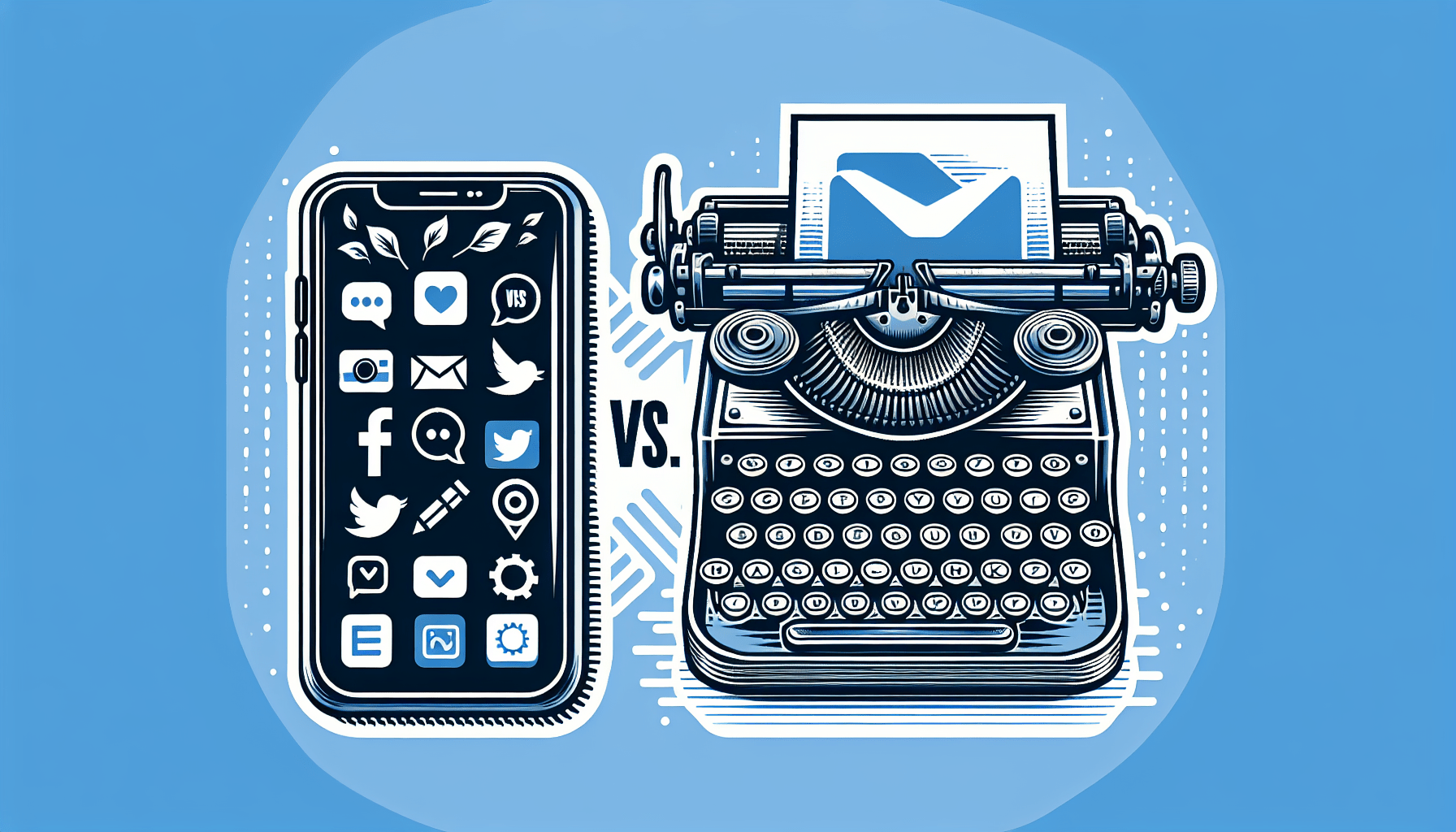In the world of marketing, there are two powerhouses vying for your attention: email marketing and social media. Each has its own strengths and advantages, but the question remains: which one is truly more effective? In this article, we will explore the benefits and drawbacks of both email marketing and social media, helping you determine which avenue is best suited for your business’s goals. So, sit back and prepare to navigate the world of digital marketing as we compare the effectiveness of email marketing versus social media.
Cost
Email Marketing is Cost-effective
Email marketing is a highly cost-effective method of reaching a large audience. With email campaigns, you don’t have to worry about spending exorbitant amounts of money on printing or postage fees. The only expenses you need to consider are the costs of your email marketing software and any additional fees for email verification or list segmentation services. Overall, email marketing allows you to send messages to thousands, or even millions, of subscribers without breaking the bank.
Social Media may require advertising budget
On the other hand, social media platforms often require an advertising budget to truly reach a wide audience. While you can create organic posts for free, the reach of these posts tends to be limited. If you want to expand your reach and target specific demographics, you may need to invest in paid advertising on social media platforms. This additional cost can add up, especially if you are looking to reach a significant number of users. Therefore, in terms of cost effectiveness, email marketing has a clear advantage over social media.
Reach
Email Marketing has a wider reach
When it comes to reach, email marketing has a clear advantage over social media. With email marketing, you can reach an extensive subscriber base, consisting of individuals who have willingly provided their contact information to receive updates from your business. This allows you to directly communicate with your audience, ensuring that your message reaches their inbox.
Social Media allows targeting specific audience
While email marketing has a wider reach, social media platforms offer the advantage of targeting specific audiences. Social media algorithms enable businesses to target individuals based on their demographics, interests, and online behaviors. This targeted approach allows you to reach the right people who are more likely to engage with your content. However, it should be noted that even with precise targeting, your content may still get lost in the vast sea of social media posts.

Personalization
Email Marketing allows personalization
Personalization plays a crucial role in marketing success, and email marketing excels in this area. With email campaigns, you have the ability to tailor your messages to individual subscribers. By using personalization tags, you can dynamically insert each subscriber’s name or other specific details into the email, creating a more personalized experience. Personalized emails are more likely to grab your subscribers’ attention and lead to higher engagement rates.
Social Media offers limited personalization
In contrast, personalization options on social media platforms are more limited. While you can address users by their usernames and target them based on their interests, the level of personalization is not as sophisticated as email marketing. Social media posts typically have a more general appeal, reaching a broader audience but sacrificing the personalized touch that email marketing offers.
Conversion
Email Marketing has higher conversion rates
One of the primary goals of any marketing campaign is to drive conversions, and email marketing has consistently shown higher conversion rates compared to social media. According to various studies, email marketing generates a higher return on investment (ROI) compared to social media marketing. This higher conversion rate can be attributed to the fact that email subscribers often willingly provide their contact information, indicating a genuine interest in your products or services. Consequently, they are more likely to make a purchase or take the desired action.
Social Media has lower conversion rates
While social media can be a valuable tool for building brand awareness and engaging with your audience, it tends to have lower conversion rates. The nature of social media platforms makes it more challenging to drive direct conversions. Users often view social media as a place for entertainment and social interactions, rather than for making immediate purchasing decisions. Therefore, while social media can contribute to your overall marketing strategy, it should be complemented by email marketing to maximize conversion rates.

Engagement
Email Marketing provides better engagement
Email marketing provides a higher level of engagement compared to social media. When someone subscribes to your email list, they have expressed a genuine interest in your brand and want to stay connected with you. This results in a more captive audience who is eager to receive updates, promotions, and valuable content from your business. With well-crafted emails, you can create personalized and engaging experiences that drive the reader to take action.
Social Media offers interactive features
Social media platforms, on the other hand, offer interactive features that encourage engagement, such as likes, comments, and shares. Users can directly interact with your content, providing feedback and sparking discussions. These features allow for more immediate and public conversations compared to email marketing. However, it is important to note that while social media engagement may be more visible, email engagement tends to be more valuable as it occurs within a more personalized and intimate environment.
Metrics
Email Marketing provides detailed metrics
Email marketing provides detailed metrics that allow you to track the success of your campaigns. You can monitor metrics like open rates, click-through rates, conversions, and subscriber growth. These metrics provide valuable insights into the effectiveness of your email campaigns, allowing you to make data-driven decisions and optimize your strategies. With access to these detailed metrics, you can continually improve your email marketing efforts and achieve better results over time.
Social Media offers basic metrics
While social media platforms provide basic metrics, such as impressions, likes, and shares, they tend to fall short in terms of the depth of data available. While engagement metrics are helpful, they may not provide a comprehensive picture of your campaign’s success. To gain a deeper understanding of the impact of your social media marketing, you may need to invest in additional tracking tools or rely on more generalized insights.
Content Format
Email Marketing allows longer-form content
With email marketing, you have the flexibility to deliver longer-form content directly to your subscribers’ inboxes. This format allows you to provide more detailed information, tell compelling stories, and showcase your brand’s personality. By crafting well-written emails with valuable content, you can cultivate a sense of trust and credibility with your subscribers, leading to higher engagement and conversions.
Social Media favors short and visual content
Social media platforms, on the other hand, favor shorter and visually appealing content. With character limits and constant scrolling, capturing the attention of users on social media requires concise and engaging content. Social media posts often rely on eye-catching visuals, such as images and videos, to quickly convey messages and engage viewers. While longer-form content can be shared via links or captions, the emphasis on brevity and visual appeal is more prominent on social media.
Integration
Email Marketing can be integrated with other platforms
Email marketing offers seamless integration with other platforms and tools, allowing you to enhance the effectiveness of your campaigns. You can integrate your email marketing software with customer relationship management (CRM) systems, e-commerce platforms, and analytics tools to streamline your marketing efforts. This integration enables you to automate processes, segment your audience, and gather valuable data for targeted campaigns.
Social Media allows integration with websites and apps
On the other hand, social media platforms provide integration options with websites and mobile applications. By embedding social media widgets or sharing buttons on your website or app, you can encourage users to engage with your brand’s social media profiles. This integration helps drive website traffic, expand your social media following, and extend the reach of your content. Integrating social media with your online presence can create a seamless and cohesive experience for your audience.
Regulations
Email Marketing must comply with data protection regulations
Email marketing is subject to data protection regulations, such as the General Data Protection Regulation (GDPR) and the CAN-SPAM Act. These regulations require businesses to obtain explicit consent from subscribers before sending marketing emails, provide clear opt-out options, and handle personal data securely. It is crucial to familiarize yourself with these regulations and ensure compliance to build trust with your subscribers and avoid legal issues.
Social Media has its own set of regulations
Social media platforms also have their own set of regulations, such as community guidelines and advertising policies. These regulations govern acceptable behavior, content restrictions, and advertising practices on each platform. It is important to familiarize yourself with these regulations to ensure that your social media activities comply with platform rules and guidelines, avoiding penalties or account suspension.
Brand Building
Email Marketing focuses on building direct relationships
Email marketing focuses on building direct relationships between your brand and your subscribers. By consistently delivering valuable content, promotions, and updates directly to their inboxes, you can establish a sense of trust and loyalty. Email newsletters, personalized offers, and exclusive content help nurture these relationships, providing a more intimate and personal connection with your audience. This direct approach fosters brand advocacy and increases the likelihood of repeat business.
Social Media helps in building brand awareness
Social media platforms, on the other hand, play a significant role in building brand awareness. With billions of users actively engaging on social media, it offers a vast audience to showcase your brand and attract new followers. Through the use of captivating visuals, engaging content, and active community management, you can create a strong online presence and expand your brand’s reach. Social media provides a platform for users to discover and interact with your brand, making it an essential tool for brand building.
In conclusion, while both email marketing and social media have their strengths and weaknesses, it is clear that email marketing holds several advantages over social media. Email marketing is cost-effective, allows for personalization and targeted reach, and provides detailed metrics. It also excels in conversion rates, engagement, and longer-form content delivery. Social media, on the other hand, is effective for brand awareness, offers interactive features, and allows integration with websites and apps.
To maximize the effectiveness of your marketing efforts, a combination of both email marketing and social media is recommended. By leveraging the unique benefits of each platform, you can create a comprehensive marketing strategy that reaches a wider audience, builds brand awareness, and drives conversions.

